THE DIG (2021)
An archaeologist embarks on the historically important excavation of Sutton Hoo in 1939.
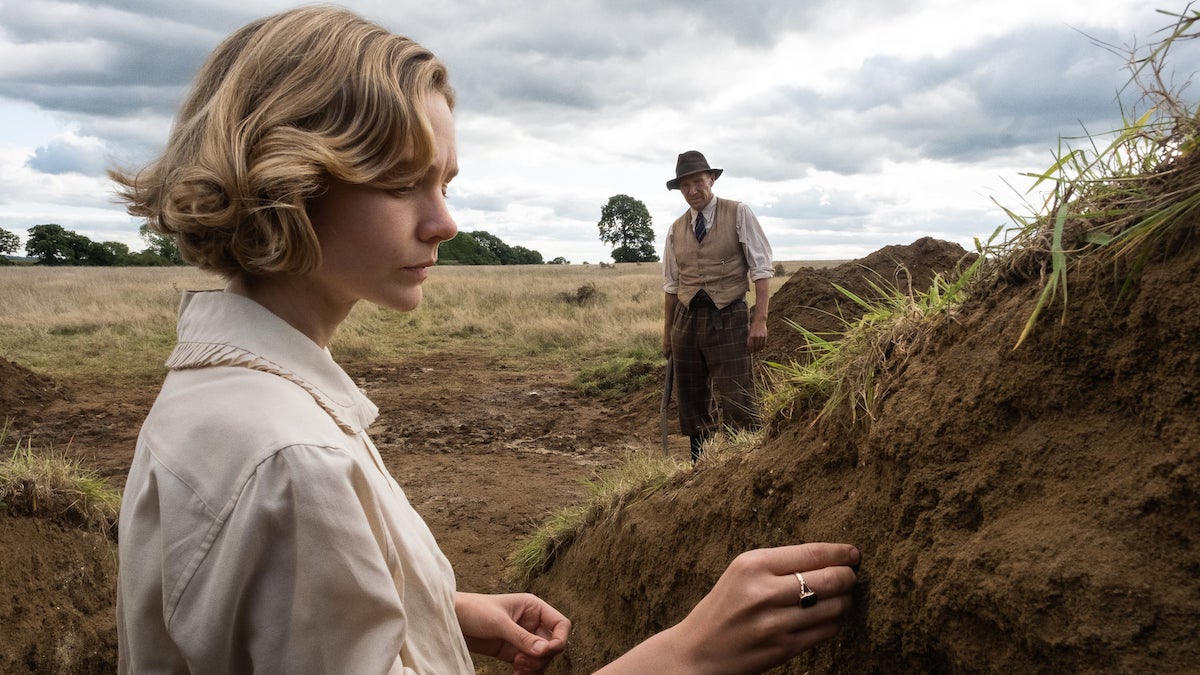
An archaeologist embarks on the historically important excavation of Sutton Hoo in 1939.

At first glance, The Dig looks like yet another exercise in English nostalgia porn; complete with plucky blonde heroine striding through fields while RAF fighter planes roar overhead, a strong-willed rustic bloke offering a hint of Lady Chatterley’s gamekeeper, a well-spoken little boy in shorts saying the things the grown-ups daren’t, and the standard-issue wistful score.
Look beneath that, though, and it’s a more interesting movie than some of those trappings suggest. It’s also a beautifully shot and universally well-acted one (cinematographer Mike Eley is Ralph Fiennes true co-star), and if it’s never surprising, it also never resorts to the clichés one might expect.
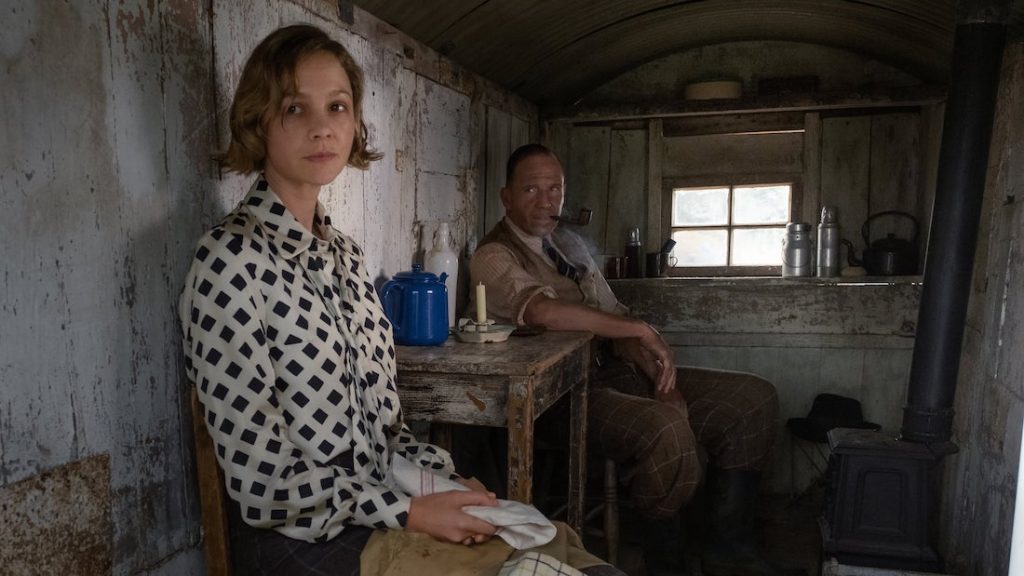
Indeed, it’s unusual in not focusing on love or loss, the two mainstays of the nostalgia school of filmmaking. The key idea here is class: specifically the conflicts between Basil Brown (Fiennes), a self-taught “excavator” of ancient sites in 1930s East Anglia, and the posher professional archaeologists from the museums.
Basil’s hired by Edith Pretty (Carey Mulligan) to excavate some mounds on the land adjacent to her Suffolk country home. It’s clear, although not overtly so, that they connect because they’re both outsiders; Basil’s not part of the archaeological establishment, and Edith’s a widower not reliant on a husband. Director Simon Stone is frank about this:
I am an outsider and the film is about Basil Brown as an outsider, someone who doesn’t necessarily belong in the position of responsibility that he has been given. He doesn’t follow the protocol of the class system, his blindness to it is what lets him get away with being so determined in his work. They have a moment of connection over their discriminations. He being of a social class not allowed or supported to go to university and she as a woman whose father didn’t want her to go to university. They connect over these forms of oppression, and that’s a beautifully modern look at how the obstacles that women and the disenfranchised classes are uniquely connected.
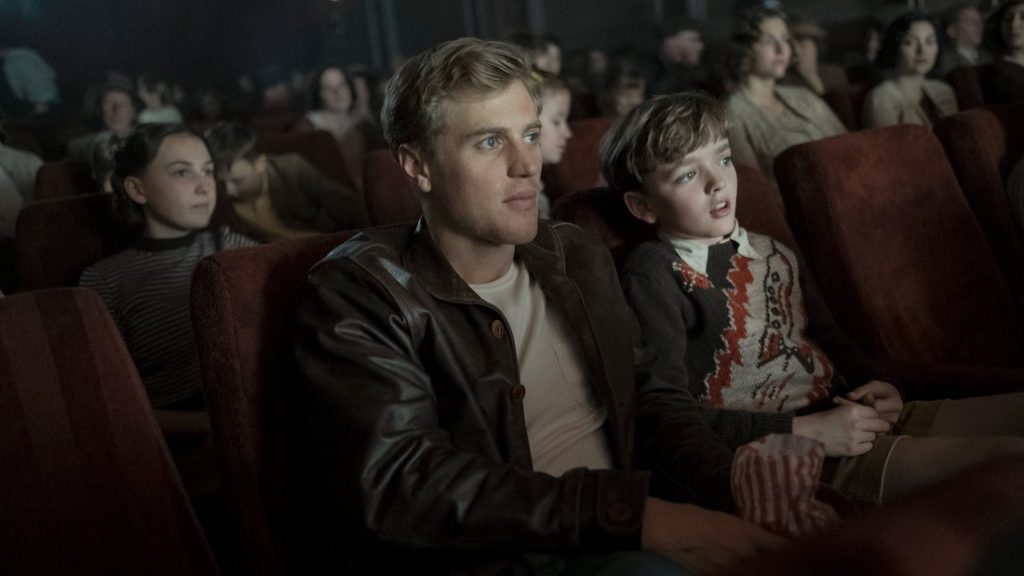
It’s this bond of shared experience between them that makes Edith keep Basil on the job, even once it’s clear something important’s been found beneath one of the mounds, and both the local museum in Ipswich and the British Museum in London are desperate to take over the dig.
Meanwhile, war with Germany looms, and one of the museum archaeologists—young Peggy (Lily James)—begins a possibly doomed romance with Edith’s strapping cousin Rory (Johnny Flynn), who’s about to join the Royal Air Force. (The Dig’s based on a namesake novelisation of historical events by John Preston, Peggy’s real-life nephew.)
That’s pretty much it as far as plot goes! The dig, of course, reveals the Anglo-Saxon artefacts of Sutton Hoo, which through this and subsequent excavations became some of the most important archaeological discoveries ever made in Britain. The emotional entanglements of the main characters—Basil, Edith, Peggy, Rory, Peggy’s husband Stuart (Ben Chaplin)—largely play second fiddle to this discovery, but to the film’s credit they don’t always go in predictable directions.
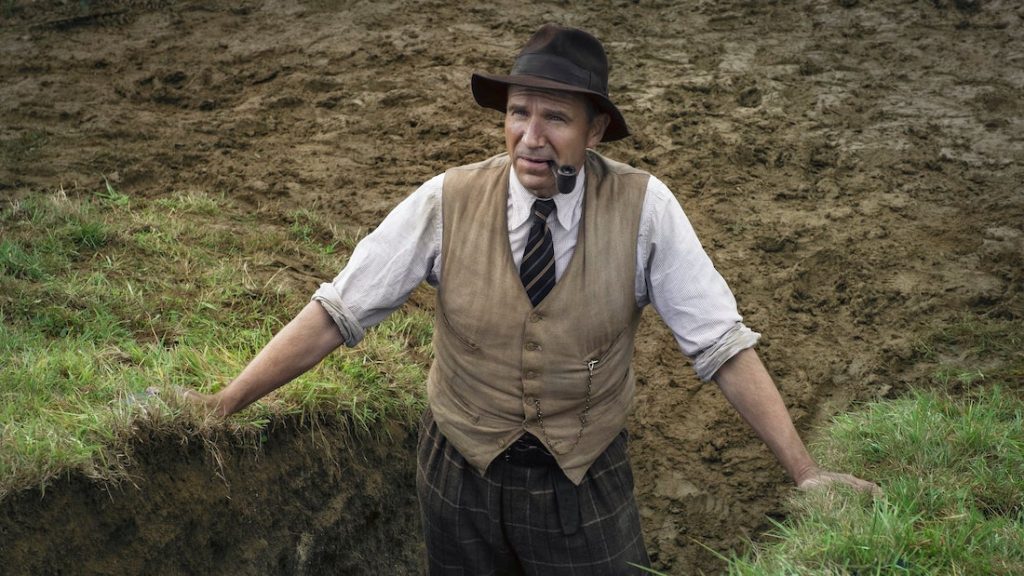
Telling a historical story brings its own pitfalls, and The Dig could’ve been as flat as the gorgeous East Anglian landscapes in which it’s set, and where much of it was filmed—although the production wasn’t granted access to the real historical site. After all, the briefest of visits to Wikipedia would confirm that Basil wasn’t fired, despite the efforts of a Cambridge archaeologist (Ken Stott) dispatched by the government to supervise, so there’s little at stake for the audience to worry about, and less tension.
But the superb visuals (above all, perhaps, breathtaking views of the sun burning through dawn mist), combined with several fine performances, make The Dig eminently watchable if never totally engrossing.
Fiennes is convincing as the proud, determined, slightly obsessive Basil (“I may not be a fellow at Cambridge but I worked out what was down there”), and he manages a plausible Suffolk accent without laying it on too thick. Mulligan (younger than the real Edith) has a sketchier character to work with, so her main function is setting things in motion and acting as audience proxy in befriending Basil, which she does convincingly.
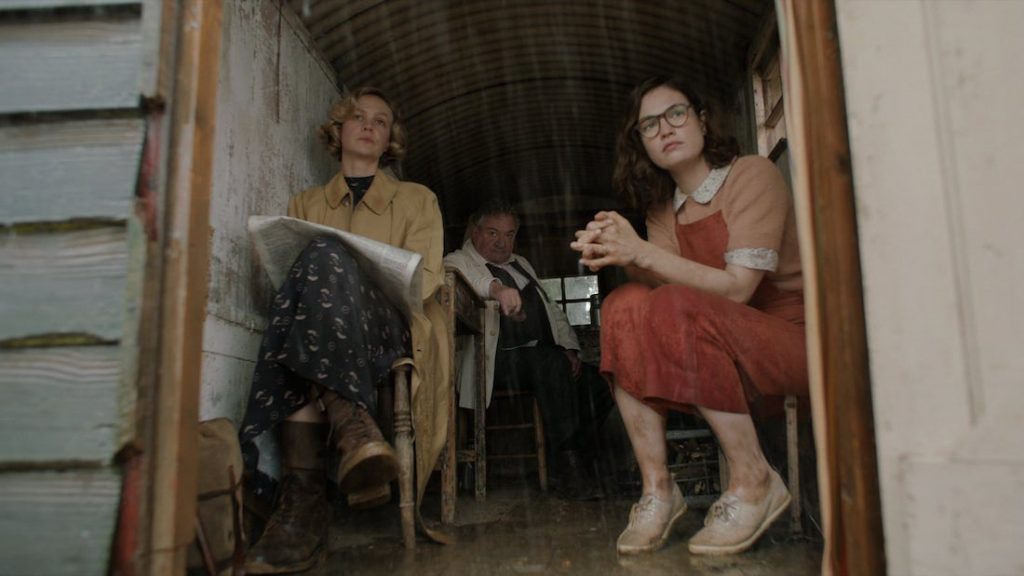
James, meanwhile, has one of the most interesting roles in The Dig, combining aspects of Basil and Edith. Her Peggy’s determined to be part of the male archaeological world even when praise only comes in the form of a condescending “clever girl”. Monica Dolan also contributes a nice turn as Basil’s long-suffering wife.
Stott is also great fun, if rather caricatured, as indeed are all of the foppish and pompous academic types. The most interesting of them, and also the most credible, is Chaplin as Peggy’s husband. He’s older than her, probably born middle-aged, rather nervous, and seemingly relieved to let her go when she decides she’d rather be with Rory. He realises, perhaps, that he’s never going to be comfortable with her easygoing style. He calls her “Margaret” and she responds “my name is Peggy”.
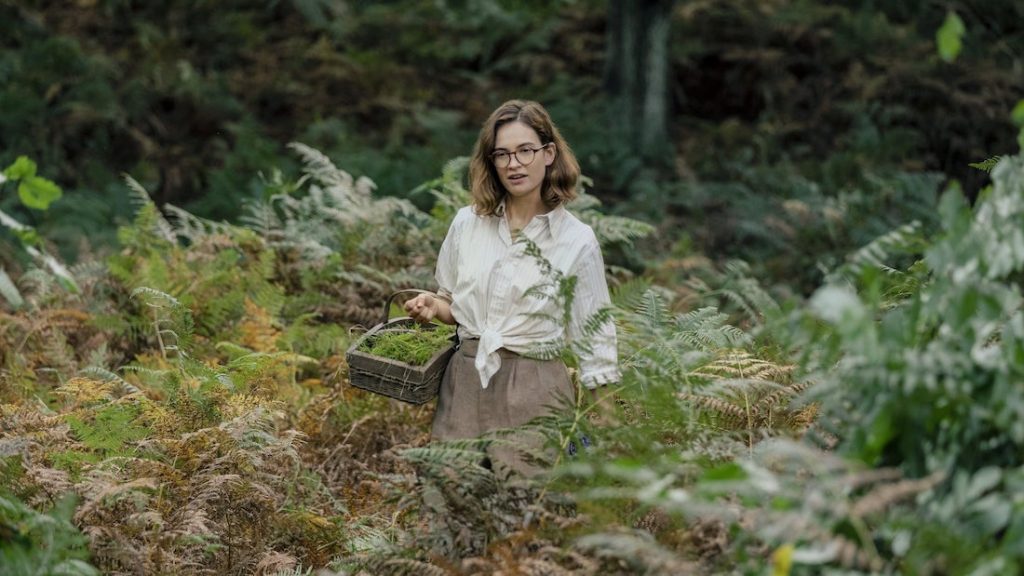
Stone’s direction can occasionally be disconcerting (there’s some cross-cutting out of sequence, and on more than one occasion a voiceover that spills from the relevant scene into another), but for the most part he stays away from fancy technique and lets the performances and Eley’s terrific photography do their job, supported by a sturdy if unremarkable narrative.
The outsider-vs-establishment thing has been done many times before, of course, but it’s done well here without overstating the case. Basil’s only a little bit salt-of-the-earth, while the arrogance of the professional archaeologists is always believable. So is the almost unspoken bond between him and Edith, across a social as well as a gender gulf, and indeed most of the character’s actions seem believable of real people, rather than contrived plot devices. (Did I mention it’s absolutely ravishing to look at?)
It’s also refreshing to see a relatively realistic archaeology movie where nobody’s unearthing ancient demons, finding long lost cities, or the Ark of the Covenant. A film where a triumphant moment is marked with the line “Brown has just shown me a Merovingian tremissis!” Indiana Jones, eat your heart out…
UK | 2021 | 112 MINUTES | 2.00:1 | COLOUR | ENGLISH

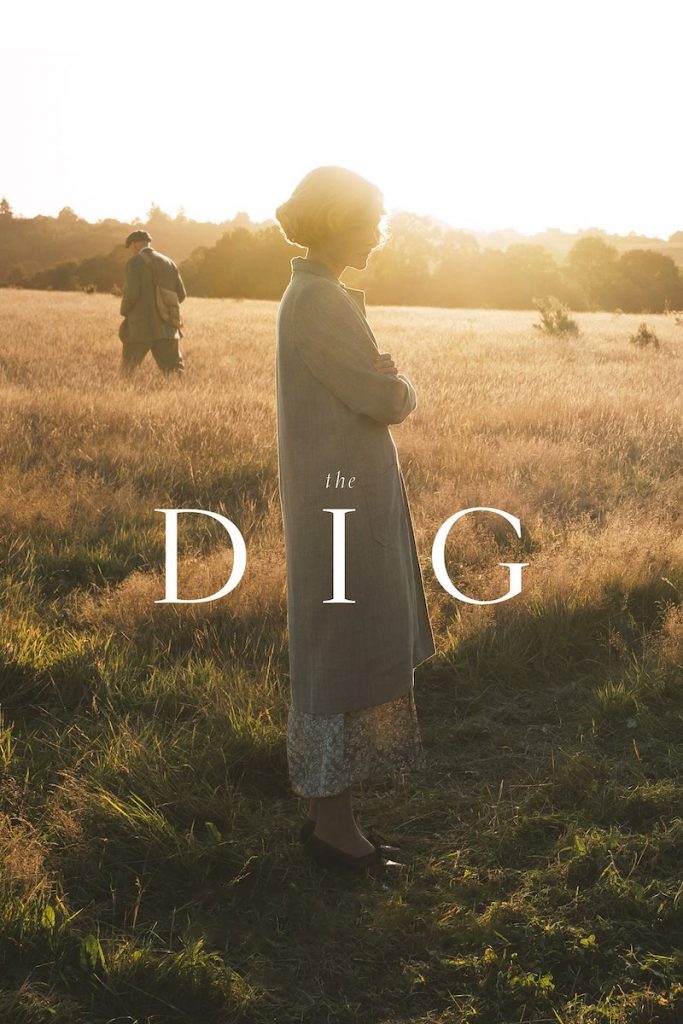
director: Simon Stone.
writer: Moira Buffini (based on the novel by John Preston).
starring: Carey Mulligan, Ralph Fiennes, Lily James, Johnny Flynn, Ben Chaplin, Ken Stott, Archie Barnes & Monica Dolan.
